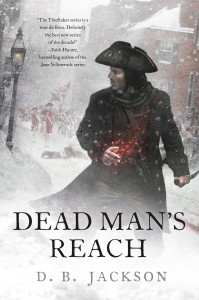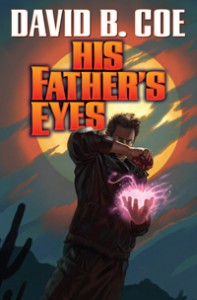As I described in a recent Writing-tip Wednesday post, I have been working recently on a trunk series — a pair of books, the first two in a projected trilogy, that I initially wrote nearly ten years ago. I have returned to working on these books for a couple of reasons. First, I’ve always loved the storylines, the characters, the relationships — these stories spoke to me when I wrote them, and have stayed with me in the years since. And second, in the midst of this emotionally challenging year, I have found it hard to create new worlds and projects. I’m not sure why, but there it is. On the other hand, polishing older work, or returning to old worlds for new stories, as I’ve done with Thieftaker, has been productive, rewarding, and even comforting.
In the previous post about trunk novels, I mentioned that while the first book in this series needed close line editing and little more, the second book was “a hot mess.” I’m now neck-deep in my edits of the second book and that impression still holds. The novel has tons of potential, but when I left off with it years ago, it had a number of significant flaws. Which, I suppose, is why it wound up in the proverbial trunk.
Many of us have novels that need work, projects that we’ve set aside, or even works-in-progress that we know have problems. I thought it might be helpful to give you a sense of how I am tackling this rewrite.
1) The Initial Read-through: I started by re-reading the two books in quick succession. I didn’t try to edit as I worked. I just wanted to remind myself of the current state of the novels — the content and the style. I made a few notes as I read, but mostly I approached them as a reader might.
2) The Line Edits: Yes, usually line edits are the last thing we do, after what is known in the business as a “developmental edit.” I chose to do the line edits first, even on the second book, which needs so much structural work. Why? Well, first because some of the prose was so rough that I couldn’t imagine revising the book and ignoring the problems. Those problems included passive constructions, overuse of “that” and past perfect constructions (using “had”), over-explaining, general wordiness, and “humorous” passages that fell flat. Second, I started with the line edits because doing these close revisions allowed me to study the narrative elements more closely and become more familiar with the structural problems I wished to address.
3) The Ruthless Cuts: This is a different editing task, but I actually did it while going through the line edits. There were elements of the story that just didn’t work as written. Unfortunately, at least one of them included some of the best written passages in the draft. Nevertheless, they had to go. I shortened one section of the book by 6,000 words, and cut a thousand from another scene as well. Overall, including scene cuts and general tightening of the prose, I have cut well over 12,000 words from the book. And what a difference this has made. The prose is concise and punchy, and the story flows far better than it did.
4) The Brainstorming: This is where I am now. The book currently stands at about 72,000 words. I can probably delete another thousand, but I’ve cut most of the fat from the manuscript. The story is better than it was, but it needs certain elements inserted along the way and it needs an ending. A good ending. Not the train wreck I was in the midst of writing when I gave up on it a decade ago. By now, though, having read it front-to-back twice, and having done my close edit of the writing, I am steeped in the story and ready to tackle the problems.
When I brainstorm, I tend to open a file in my word processor and type stream-of-consciousness, asking myself questions and answering them on the keyboard. That’s just my approach — your mileage may vary. The point is, I am considering how to work in key elements currently missing from the story. I am figuring out how to work in a new idea for a plot twist that occurred to me during the line edits. And I am keeping better track of all my plot threads, making certain that this ending ties everything up as it should.
5) The Implementation: When I start writing the new scenes, including my concluding chapters, I will create them in separate files. I do this because I find it freeing. It’s totally a mind-game. When I am writing a new book, I work in a single document from start to finish. But when revising, rather than mess with that original file, I not only make a working duplicate, I also create new files for big inserts and additions. That way even if the new scene turns out to be a disaster, the original manuscript is no worse off. Again, it’s something I do out of consideration for my own obsessiveness. And it works.
6) The Final Edit: When I have written and polished these new scenes and pasted them into the manuscript, I’ll then set the novel aside for a while. I’ll work on other projects — I have stories to read for the anthology I’m co-editing; I want to outline the third book in this series; and other stuff… After maybe five weeks, I’ll come back to this book and read it through again. I’ll do a final polish on the prose, but more important I’ll make certain the plot works and that the new narrative elements blend seamlessly with the old. When I’m satisfied, I’ll send both books, volumes one and two, to Beta readers. By then, I hope, I’ll be ready to write the concluding volume of this trilogy. I’ve been thinking about the characters and story for nearly ten years. It’s time I finished it.
I hope you’ve found this deep dive into my process helpful.
Keep writing!










 My first book, Children of Amarid, was a fairly standard epic fantasy, though it had the seeds of more within the nuances of its plot. It was my second novel, though, The Outlanders, that convinced me I could succeed as a writer. The reason was, that second book was different. It introduced a technological, crime-ridden world unlike anything I’d ever tried writing. It created an unusual dynamic among three of my lead characters — two of the characters, who were allies, spoke different languages, and they had to rely on the third for translation. But neither of them trusted that third character.
My first book, Children of Amarid, was a fairly standard epic fantasy, though it had the seeds of more within the nuances of its plot. It was my second novel, though, The Outlanders, that convinced me I could succeed as a writer. The reason was, that second book was different. It introduced a technological, crime-ridden world unlike anything I’d ever tried writing. It created an unusual dynamic among three of my lead characters — two of the characters, who were allies, spoke different languages, and they had to rely on the third for translation. But neither of them trusted that third character. Still, I can say this: It’s easy to grow attached to one particular franchise, one particularly world and set of characters and style of story. Certainly I have written a good deal in the Thieftaker world, and will soon be coming out with new work about Ethan Kaille, Sephira Pryce, et al. The fact is, though, each time I have moved on to a new project, I have tried (admittedly with varying degrees of success) to challenge myself, to force myself to grow.
Still, I can say this: It’s easy to grow attached to one particular franchise, one particularly world and set of characters and style of story. Certainly I have written a good deal in the Thieftaker world, and will soon be coming out with new work about Ethan Kaille, Sephira Pryce, et al. The fact is, though, each time I have moved on to a new project, I have tried (admittedly with varying degrees of success) to challenge myself, to force myself to grow. After the LonTobyn books, I moved to Winds of the Forelands and Blood of the Southlands, which demanded far more sophisticated world building and character work. After those, I turned to Thieftaker, adding historical and mystery elements to my storytelling and limiting my point of view to a single character. I also started working on the Justis Fearsson books, which explored mental health issues and were my first forays into writing in a contemporary setting. Then I took on the Islevale books, time travel/epic fantasies that presented the most difficult plotting issues I’ve ever faced.
After the LonTobyn books, I moved to Winds of the Forelands and Blood of the Southlands, which demanded far more sophisticated world building and character work. After those, I turned to Thieftaker, adding historical and mystery elements to my storytelling and limiting my point of view to a single character. I also started working on the Justis Fearsson books, which explored mental health issues and were my first forays into writing in a contemporary setting. Then I took on the Islevale books, time travel/epic fantasies that presented the most difficult plotting issues I’ve ever faced.


